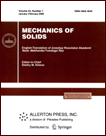 | | Mechanics of Solids
A Journal of Russian Academy of Sciences | | Founded
in January 1966
Issued 6 times a year
Print ISSN 0025-6544
Online ISSN 1934-7936 |
Archive of Issues
| Total articles in the database: | | 13427 |
| In Russian (Èçâ. ÐÀÍ. ÌÒÒ): | | 8178
|
| In English (Mech. Solids): | | 5249 |
|
| << Previous article | Volume 57, Issue 5 / 2022 | Next article >> |
| A.A. Burenin, L.V. Kovtanyuk, and G.L. Panchenko, "On the Calorific Value of a Rectilinear Elastoviscoplastic Flow, Taking into Account the Production of Heat Due to the Friction of a Material Against its Boundary Rough Surface," Mech. Solids. 57 (5), 984-996 (2022) |
| Year |
2022 |
Volume |
57 |
Number |
5 |
Pages |
984-996 |
| DOI |
10.3103/S0025654422050168 |
| Title |
On the Calorific Value of a Rectilinear Elastoviscoplastic Flow, Taking into Account the Production of Heat Due to the Friction of a Material Against its Boundary Rough Surface |
| Author(s) |
A.A. Burenin (Institute of Machinery and Metallurgy FEB RAS, Komsomolsk-on-Amur, 681005 Russia, burenin@iacp.dvo.ru)
L.V. Kovtanyuk (Institute of Automation and Control Processes FEB RAS, Vladivostok, 690041 Russia, lk@iacp.dvo.ru)
G.L. Panchenko (Institute of Automation and Control Processes FEB RAS, Vladivostok, 690041 Russia; Vladivostok State University of Economics and Service, Vladivostok, 690014 Russia, panchenko@iacp.dvo.ru) |
| Abstract |
Calculations are given of the distribution of strains, stresses, and temperature during the deformation of an elastoviscoplastic material clamped between coaxial cylindrical surfaces and initially retained by dry friction against the boundary surfaces. Due to the given variable advancement of the outer of them, the material slips and its viscoplastic flow begins (not simultaneously). The process of flow development with its subsequent deceleration to a stop, material unloading and cooling to room temperature is considered. Heat is produced by sliding friction against a rough boundary surface and by irreversible deformation (a related problem of large deformation theory). A deformable material is considered to be mechanically incompressible, when the change in its volume is associated only with thermal expansion, the yield strength is assumed to depend on temperature. |
| Keywords |
thermoelasticity, viscoplastic flow, large deformations, deformational heat production, thermal conductivity |
| Received |
20 May 2022 | Revised |
22 May 2022 | Accepted |
23 May 2022 |
| Link to Fulltext |
|
| << Previous article | Volume 57, Issue 5 / 2022 | Next article >> |
|
 If you find a misprint on a webpage, please help us correct it promptly - just highlight and press Ctrl+Enter If you find a misprint on a webpage, please help us correct it promptly - just highlight and press Ctrl+Enter
|
|

 Russian
Russian  English
English